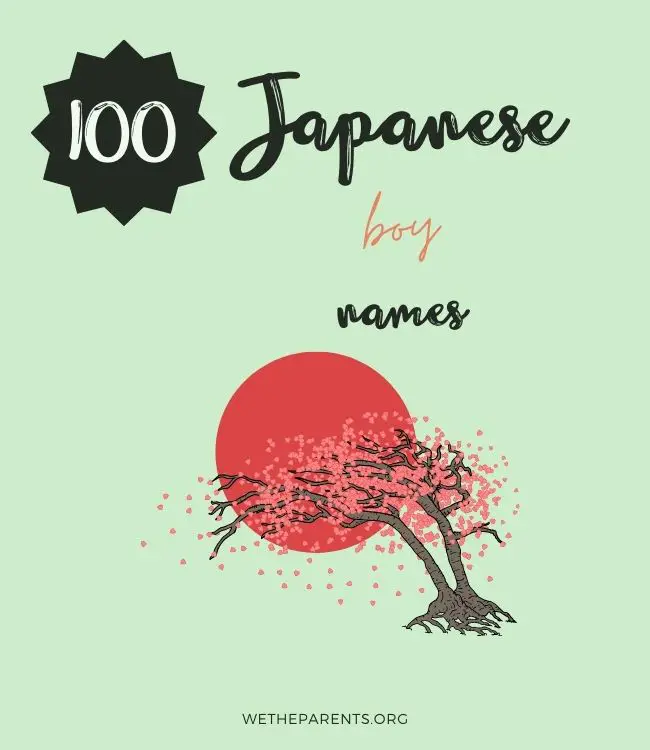If you’re looking for a simple yet deeply meaningful and inspirational name for your new baby boy, a Japanese name may be just the right fit. Japanese names often reflect on emotion, nature, and positive traits, and their multisyllabic construction allows for a range of diverse combined meanings.
Ready to learn more about Japanese male names and their meanings?
Japanese naming conventions
As is the case in both China and Korea, in Japan, a baby’s given or “first” name is written after their surname. Japanese children are referred to by their first name, but once they reach adulthood, they will be referred to by their surname followed by an honorific suffix or title indicating their social position.
These titles can vary significantly based on who is speaking and who is being spoken to. Some of the most common of these include:
- San: A versatile title which can be used in most every situation. It is written and spoken as (name)-san.
- Sama: This title is reserved for polite communications with a superior or customer, or in formal written communication, but is generally considered too formal for polite conversation. This title is written and spoken as (name)-sama.
- Kun: This title is reserved for young adult and adult males who are younger than the speaker. It is written and spoken as (name)-kun.
- Chan: This casual title is used for very close friends, within families and to refer to small children. It is written and spoken as (name)-chan.
- Sensei: The most formal title, this suffix is reserved for highly educated experts like doctors and educators. It is written and spoken as (name)-sensei, though the title may also be used independently of the individual’s surname.
Japanese naming conventions do not include the use of a middle name, which is largely a Western concept. Names are usually written in Kanji, or traditional Japanese characters, with both the surname and the given name requiring either one or two Kanji.
Some simple surnames and given names can be represented by one Kanji, but if a name has a more complex meaning, it is typically written with two Kanji, as individual Kanji tend to represent a single word or concept. Given names often have a suffix indicating a special meaning; in this case, the given name consists of one Kanji for the name itself and a second for the suffix.
Some common suffixes for Japanese male names include:
- -rō: This can mean son, but can also mean clear or bright.
- -ta: This means great, thick, or large, indicating power.
- -o: This simply means man, or male.
- -ichi: This indicates the first son in a lineage.
- -jiro: This indicates the second son in a lineage.
Japanese baby boy names A-Z
A
- Aoi/Ao – a Japanese word meaning the color blue, in Japan’s top 10 boys’ names in 2020
- Aito – sea, ocean, darling child, cherished one, ‘ai’ means love in Japanese
- Akito – one who is bright, sunshine, someone who is like Autumn
- Asa – a Japanese name that means healer/doctor, sand, or morning, is a unisex name
- Asahi – the rising sun, morning sunlight, can also be used for girls
B
- Benjiro – one who enjoys peace and has a deep desire for harmony
C
- Chibi– a small child, short and cute, a commonly used Japanese slang word
- Chiko – is a pledge, can also mean arrow, and is pronounced chee-koh
- Chikyu – a Japanese word for Earth, ground, or a long time
D
- Dai – a person who shines, large, great, of Japanese and Welsh origin, pronounced dah-ee
- Daiki – ‘dai’ means great and ‘ki’ means brightness, to be filled with light, can also mean large tree
- Daiksuke – to be a great help, was one of the most popular boys’ name in Japan in the 1980s
- Daichi – one who is from the Earth, large, great, having intellect
- Danuja – a ruler or knight, can be used for both girls and boys
E
- Eita – a Japanese word that means clear, crystal
- Enkai – deep ocean, another meaning is a Japanese banquet
- Enyo – blue, open, or high sea
F
- Fuji– unmatched and unique, one who dwells near the river where wisteria grows, wealth
G
- Genkei – deserving of honor, to have integrity
- Goku – to be aware of emptiness, the name of the main character of a popular manga series
H
- Hageshī – fierce, powerful, tremendous, and amazing
- Hakaku – Japanese for a white crane
- Hanasu – the Japanese word meaning to tell, speak, communicate, also to want
- Haru – the season of Spring, clear weather, light
- Haruma – to be groundbreaking, elevated, can also mean spring or horse, a popular masculine Japanese name
- Haruto – the sun, to soar, flight, light, a very popular boys’ name in Japan
- Hayato – Japanese for falcon or falcon person, the Hayato were an ancient Japanese people
- Heiwa – a rare unisex Japanese name that means peace and harmony, to exude calmness, to soften
- Hinata – meaning toward the sun, a sunny place, this name is used for both males and females and was in Japan’s top ten boys’ names in 2014
- Hiro – to be generous and tolerant, widespread, pronounced like the word hero
I
- Ichiro – Japanese name for the first son, also means clear and bright, pronounced i-chi-ROH
- Isamu– to be brave, courageous, gallant, used for girls and boys
- Izanagi – God of creation, the first male, a male who invites, in Japanese mythology the god Izanagi was the husband of Izanami and traveled to underworld in an attempt to save her
J
- Jiro/Jirou – pronounced jee-roh, meaning the second son
- Jundo – meaning purity, innocence, sincerity, virtue
- Junpei – meaning pure, kind, tolerant, and genuine
- Juro – farmer and Earth worker, a form of George
K
- Kai – to paddle, ocean, shell, recovery, is a popular multicultural name
- Kaede – Japanese for maple, could be used for either gender
- Ki – one of the most commonly used words in the Japanese language, meaning feelings, energy, mind, spirit, atmosphere, and tree, pronounced like key
- Kiseki – wonder, marvel, a miracle, divine
- Kaito – to soar over the sea, to go beyond
- Kane – the Japanese word for bell, a different and unique way to spell Cain
- Kaneko – a Japanese name meaning the golden child
- Kanon – the land of the reeds, flowers, blossom
- Kazue – a blessing, harmony, and peace
- Kazuki – a peaceful tree, hope, peace, is a popular unisex name
- Kazuya – to exude peace and calm, to be one, a person in harmony, was popular in Japan in the 1980s
- Kenichi – the strong firstborn, which would make a powerful name for your eldest
- Kohi – a Japanese word that means little one, is also used for girls
- Kota – to bring good luck and happiness
M
- Maki – it means true and precious in Japanese and is a unisex name
- Mana– a spirited person, full of personality, favorite
- Manzoku – the Japanese word for contentment, gratification, comfort, and harmony
- Matsu – pine, to wait or expect
- Mei – dark, shadow, would make a nice first or middle name
- Michiaki – a road, lane, or pathway
- Midori – the color green, a fresh and sweet name for a baby boy or girl
- Minato – the Japanese word for harbor or port, a popular name in Japan
- Mori – the Japanese word meaning forest or woods, one of the top names for baby boys in Japan
N
- Namiko – a child who surfs, child of the waves
- Nana – a unisex name meaning fresh, green vegetables
- Natsu – one born in the summer, perfect for those summer babies
- Niko – the conquest of the nation, daylight, a multicultural name
- Nozomu – a hope or wish, expectation, prospect, this one has a lot of nickname potential
O
- Orochi – the Japanese word for a big snake
R
- Raden – the God of thunder, there are several similar Japanese names that also mean the God of thunder
- Raion – the Japanese word for lion, an original and powerful boys’ name
- Reiji – a well-behaved, kind child, having manners, proper, a common masculine name
- Ren – the Japanese word for lotus, which is sacred in Japan for its ability to come from dirty waters and become a beautiful flower, Ren was the top boys’ name in Japan in 2020
- Riku – popular boys’ name in Japan, meaning land, also a well-known Finnish name
- Rio – like the river, moving water, also can mean place of the cherry blossom, historically a boys name
- Ritsu – Japanese word for law or regulation, in Japan’s top 10 boys names in 2020
- Ryo – a survivor, excellent, one who can excel and master, is used as a unisex name
- Ryuu – a Japanese word meaning dragon, one with a dragon spirit
- Ruka – a bright blue flower, also means spiritual
S
- Saiko – a Japanese word for your oldest child
- Sana – one with talent, brilliance, and intellect, also can mean summer or thread
- Sandā – meaning thunder or thunderclap
- Sato– to help, this one makes a lovely unisex name
- Satoshi – to be smart and intelligent, to have knowledge
- Shiro – Samurai, the four sons, also can mean white
- Shizen – Japanese for nature/human nature, spontaneity, spirit
- Shimizu – pure water, to purify or cleanse, is also a surname
- Sora – the sky or universe, chirping bird, used for both girls and boys
- Sota – smoothly, large and thick, powerful, the sound of the wind, very popular in Japan
T
- Tabi – journey, travel, a long road
- Tadaaki – faithful light, can also mean Autumn
- Taishi – to be ambitious, an ambitious man, on the other hand
- Taka – another Japanese word for hawk or falcon, a strong name for a little boy
- Takeo – a brave warrior, a man who is brave, common Japanese boy name
- Takeru – a fierce warrior, noble, mountain
- Takibi – meaning fire, bonfire
- Tamaki – a Japanese name that means a boy who is a real gem
- Tsuki – the moon, alternate meaning is the month
U
- Umi – the sea, can also mean beautiful, is a short and strong name for a boy or girl
Y
- Yamato – perfect harmony, tranquility, and goodwill, is also an ancient name for Japan
- Youta – great sunlight, daylight, big man, a great name for your little boy that remains popular in Japan
- Yuki – a Japanese word meaning happiness or snow, to create value
- Yuuma – to be gentle, honest, and truthful, to take your time







